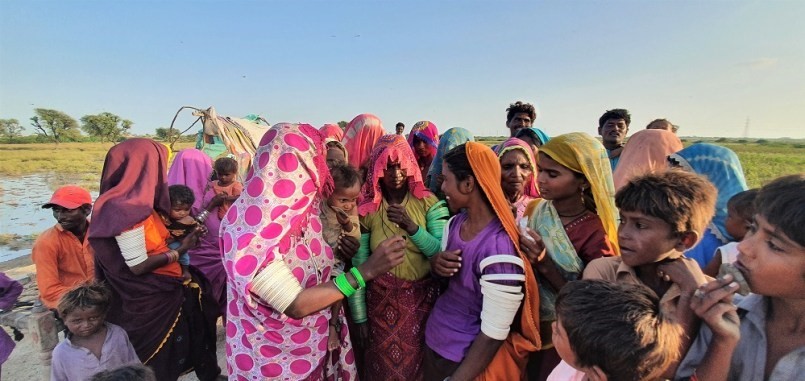
(Badin/Dadu): Floods that devastated parts of Pakistan have left thousands of owes and wounds behind. “I was running behind cars, which came to distribute the ration. I ran and ran for ration but did not get it. Instead got scratches on my leg and arm,” says a Hindu community member who is a farmer and the flood affectee on the roadside of Badin-Mirpurkhas. As she shows her injuries, she reiterates that pain is more painful empty stomach.
Floods followed by torrential rains have added to the miseries of already marginalized people in these parts of the country who are struggling for survival. Experts warn that Sindh and other regions of Pakistan are witnessing erratic rains and weather conditions. This is not only specific to Pakistan, but entire South Asia is experiencing fluctuating weather.
This time Pakistan has lost more than 1000 to floods, and about 33 million are displaced. Homes are inundated, roads and bridges swept away, and there are still many dead bodies that are missing. Sindh and Balochistan have suffered heavily, but Sindh is worse affected.
Affectee at Government’s camp: toddler was ill, and licking dirty bandage on his hand.
“We can comprehend the actual loss only when water will recede,” says Faqeer Mohammed Shaikh, a local businessperson. He has started free-boat for affected in Khairpur Nathan Shah (K.N Shah) to carry affectees to safer places.
Worsening the situation for the affectees
Badin, Dadu, or anywhere in the flood-affected areas of Sindh, affectees have similar stories to share and at the core of complaints is the fact that the state has done nothing. Instead, it treats people like trash. This reporter visited the government’s camp at Government Polytechnic Institute at Dadu to witness that people live in conditions that are worse even for animals to live.
“Flood damaged our homes and now we are left to die by the government,” says a senior citizen woman in Badin. The affectee does not have any other option but to manage survival sans any help. The rescue camp is filthy, with no water, no washrooms, and health facilities, including the availability of doctors. Not many were ready to speak about their sufferings, as they feared the wrath of influential people. Affectees were displaying their ID cards to show that they are residents who have suffered from of floods. Some of them could not suppress their anger.
“Doctors are here to have tea and chat among themselves. But they do not have time to give us medical assistance,” said one of them, who hailed from K.N Shah. Earlier, he refused to talk to the media. But then he opened up by saying that the Sindh government must jump into action and help the affected speaks, he goes on adding on how the local authorities are neglecting people in the hour of crisis.
Government’s camp in Dadu: Affected family has no tent.
The government provided them Pulao in shopper bags. However, it was stinking and not eatable. The man adds that he and his family had to eat the same food, as they had nothing else to fill their stomachs. “See this. We have to eat this for over a week. Do you think humans should eat it?” he asks showing the rancid pulao.
Another affectee joins the conversation. “Aren’t we humans?” asks the agitated woman adding how they should survive without a washroom, drinking water, and tent. Open sky and rancid pulao are what all they have.
“We have sold our jewelries to buy flour and lentils to feed our children. We are selling what we have left with us,” she says. There were women around who were cooking under the open sky.
Khairpur Nathan Shah, Dadu is under the floodwater.
Affectee, who is a widow, shared her story saying that her brother is a disabled person. When she took him to a doctor for a checkup, he rejected to do so. “My brother is deaf and dumb. He needs regular medical help,” she adds with grief.
In K.N Shah, flood-affected have lost their homes and cannot shift to Dadu as they do not have any relatives there. “Government should do a favor, give us poison,” says one of the affectees with gloom on his face.
Many of the affectees have developed skin diseases. There is malaria, diarrhea, and many complain of throat pain. Even pregnant women do not have any facilities to keep themselves healthy and get medical help. A toddler in the arms of a mother was almost licking the dirty bandage on his hand, which was not removed.
The faith contributes its role in the distribution of ration
In Badin, the story is not different. The only additional thing here was that religion played a role when it comes to the distribution of rations. There were many complaints that Shia, Hindu, or other religious affectees were not given ration. In Badin, one of the organizations refused to offer rations to Hindus.
On Badin-Mirpurkhas road, affectees say they are caught between Badin district and Mirpurkhas. Badin administration does not enroll them because they are from Mirpurkhas, and Mirpurkhas does not accept them, saying they are on the side of Badin. The mismanagement has deprived many of the food grain.
Army’s behavior was rude towards affectees
The army was in K.N Shah, but its presence did not help people. Army personnel took boats for roaming. Meanwhile, many people do not want to leave their ancestral homes despite the floods.
Affectee, a senior citizen said, “Army personnel beat them and ordered them to move one place to another place. Where do we go? Army does not give us anything.”Another affectee shared that one of the army officers slapped the flood-affected women. They did not have respect and care for people who had lost their homes. Everyone in the camp complained about the behavior of the army and said that they treated affectees like animals.
“If you do not help us, then drop a bomb on us,” says the affectee






